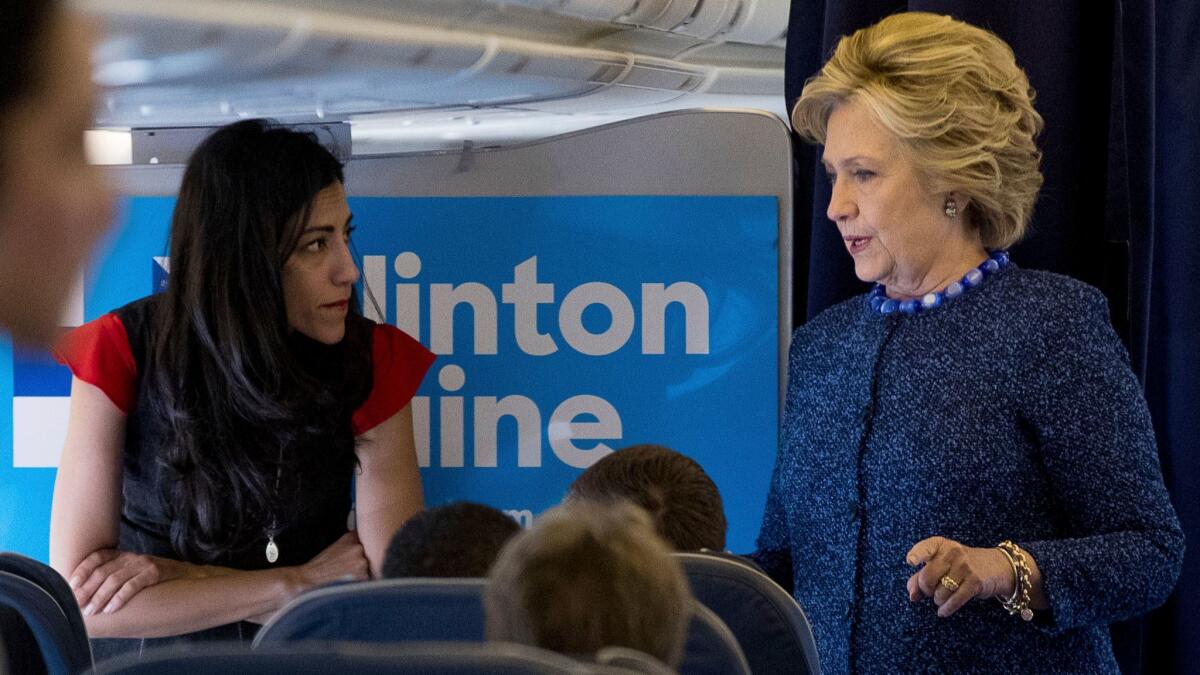FBI given warrant to examine newfound emails that could be related to Clinton investigation

Reporting from Washington — FBI agents investigating Hillary Clinton’s handling of classified information on a private email server Sunday obtained a warrant to search a computer used by former Rep. Anthony Weiner for messages they believe may be related to their inquiry, according to a law enforcement official familiar with the investigation.
Agents stumbled across the potentially relevant emails while investigating whether Weiner violated federal laws while exchanging sexually explicit texts with a 15-year-old girl in North Carolina. Weiner is the estranged husband of one of Clinton’s closest aides, Huma Abedin.
The laptop contains hundreds of thousands of emails, most of them Weiner’s, a second official said.
But while going through those emails, agents came across potentially hundreds, perhaps thousands, of Abedin’s emails related to her work for Clinton at the State Department, a third law enforcement official said.
Agents told Director James B. Comey on Thursday they had found emails on the computer that may be related to their investigation into whether Clinton mishandled classified information on her private email system. While reviewing the emails’ metadata, including subject lines, senders and recipients, agents did not identify any as having been sent to or from Clinton.
They discovered hundreds of others, however, that were to and from Abedein — including many that she forwarded to herself — that might be related to the earlier investigation of Clinton’s server, a law enforcement official said.
To review Abedin’s emails, which were not related to the agents’ inquiry of Weiner, they needed to obtain a warrant, they told Comey on Thursday.
He authorized them to seek the court authorization and informed Congress on Friday that he had directed the agents to “take appropriate investigative steps” to determine if emails contained classified information. His letter, just 11 days before election day, rocked the presidential campaign anew.
Clinton’s use of a private email system, which she used for work and personal communication while serving as the nation’s top diplomat, became public in March 2015. The FBI subsequently spent nearly a year seeking to determine whether the Democratic presidential candidate had improperly sent and received classified information on the personal account.
The FBI concluded that classified information was contained in 193 emails that were part of 81 email chains. Of those chains, eight contained top secret information, the highest level of classification.
Comey announced in July that the FBI recommended to the Justice Department that Clinton not face charges for mishandling classified information. Though he described Clinton and her aides as being “extremely careless,” he said the FBI “did not find clear evidence that Secretary Clinton or her colleagues intended to violate laws.”
The Justice Department accepted the recommendation and closed the case. Comey later testified in detail about the investigation before Congress, reiterating his position that the case was closed. Since early September, the FBI has been releasing reports of its interviews with key participants.
When agents came forward on Thursday and said they would need to take court action to review Abedin’s emails, Comey decided he had no choice but inform Congress about the development, according to a law enforcement official familiar with his thinking.
The letter was ambiguously worded and open to interpretation. It has been criticized by Democrats and some Republicans for coming so close to election day, and Comey has even drawn the private ire of top Justice Department officials. They had warned the director that sending the letter may violate guidelines prohibiting actions that might influence an election. Prosecutors and agents are also generally prohibited from talking publicly about ongoing investigations.
Follow @delwilber on Twitter
ALSO:
The FBI director had a choice in the new Clinton email probe: Follow custom, or go public
New emails? So far, voters seem mostly unmoved
More to Read
Get the L.A. Times Politics newsletter
Deeply reported insights into legislation, politics and policy from Sacramento, Washington and beyond. In your inbox three times per week.
You may occasionally receive promotional content from the Los Angeles Times.











